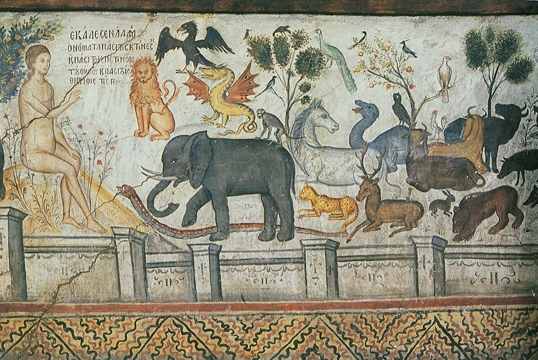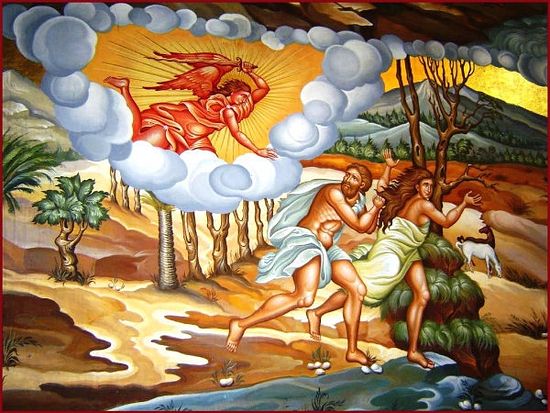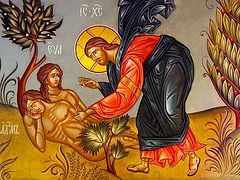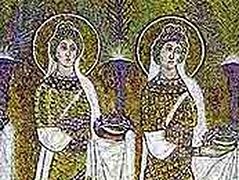
Before the fall of our first ancestors, mankind was happy: living in Paradise in close union with God and showing child-like devotion and obedience to Him, they were in need of nothing, suffered from nothing, and were fully satisfied with life. Living in happiness, man openly poured out his soul before God with childlike love, receiving Divine help from Him for his development. Man knew neither sickness nor death. All of man's happiness was because he was close to God and God was with him. As a loving father, God appeared in Paradise and conversed with man, as with good, obedient children. All of the surrounding nature was subject to man, as to its king, as the image of the Creator Himself. The inanimate earth, by the will of the Lord, brought forth only what was beneficial, what was needed by man. Sinless man knew nothing that was unneeded, that was harmful to himself, to his health or welfare. Man was placed over everything in the world. Being the image of God, a little lower than angels, he was crowned with glory and honor. But because of the cunning and evil plotting of the devil, man decided to not obey God. He independently decided to arrange his own welfare with his own power and means. He began to act against the Divine will, in opposition to Divine commandments. He ceased to obey God and at the same time was deprived of Divine help and was left alone in the midst of nature and its inhabitants. Not only did man understand and realize that all of his greatness, all of his well-being and his happiness depended not on himself, and not on nature, but that it was only and exclusively a consequence of man's proximity to God, of Divine help.
Having been deprived, because of sin, of the happiness of conversing with God and receiving instructions, man now understood his nothingness: his understanding, no longer enlightened with Divine precepts, became confused and lost in errors. His heart, no longer warmed with Divine love, became darkened with sinful inclinations and passions of the flesh. His will, not supported by help from above, became weak and unable to resist the attraction of sin and evil. Now man began to notice how evil would entangle his soul, darken his heart, and captivate his will. Although he had an understanding of good and he preferred good, loved it and hated evil, most of the time in spite of his desire, he would do evil, for evil and sin became alluring and tempting to him, while good became laborsome. Having been deprived of communion with God, the nature of man became weak, for it lost the source of its strength. It began to dry up and wither, just as a river dries up when it is separated from the sources which feed it. Before sin man was peaceful, healthy, joyful and happy, without any needs, without any sorrows, but now his conscience began to reprove him for sinning, to wound his soul like a sharp-clawed beast, giving him no peace. His body, deprived of Divine grace, subject to the changes of weather—heat, cold, and other weather conditions—became susceptible to sickness, suffering, and gradually became worn out, grew decrepit, and died. For man, death became a silent but constant reminder of his sin.
Seeing man deprived of his former royal greatness, nature ceased to be subject to him and even began to oppose him, to war against him: wild beasts began to attack him and harm him. Even the inanimate earth began to bring forth weeds instead of grain, and for his nourishment it required from him persistent heavy labor for its cultivation and fertilization. From this, misfortunes began to surround and oppress man—misfortunes on the water and on land, in the desert and among brethren, misfortunes from friends and from strangers. In the further history of mankind, all of this only continued and developed.
So this is where we must look for the cause of our misfortunes, sorrows and unhappiness. And for us the cause of our difficult life, the source of our sufferings is sin. And in our time, people who have learned to refrain from sin, people who have come close to God through prayer and fulfilling His commandments, are happy, but sinners are unhappy.
It's true that in this earthly life this is not always clearly evident. Often you can see the opposite. Very often the righteous suffer while sinners seem to prosper, enjoying all the good things in life. But this prosperity is not real. A Christian must measure life mainly by the inner spiritual condition, not by the external. Oh, if only we could see what often happens to the souls of those who seem happy! How often tears flow through the gold, how often outward prosperity merely serves as a cover for the most serious spiritual sufferings and sorrows! On the other hand, the visible daily sufferings of a righteous person only strengthen his faith in God, they only strengthen his soul and guide him along the path of moral perfection and bring him closer to God. It only seems to us that the righteous man suffers from poverty and the lack of respect for him from the powerful of this world, while, in fact, the righteous man never seeks worldly glory, and furthermore, he does not seek riches, and the loss of them is nothing to him. He always remembers the words of the Savior: Seek ye first the Kingdom of God and His righteousness, and all these things—everything needed for this temporal, earthly life—shall be added unto you (Matt. 6:33).
Let us remember, Orthodox Christians, that sin separates us from God and brings us closer to the devil as St. John the Theologian said: He that committeth sin is of the devil, for the devil sinneth from the beginning (I John 3:8). The devil is the bearer of sin, its source. Good, the fulfillment of the Lord's commandments, brings a man closer to God, brings him closer to happiness. Whoever loves himself, whoever desires happiness for himself, must withdraw from sin with all his might, he must strive for good, for whoever strives for good, strives for God. God is good, and those who do good are children of God.
In trying to justify ourselves, we often say: "We don't have any serious sins. We are ordinary sinners, like all other people." Let us remember that in evaluating a sin, most important is the spiritual disposition. As long as we are spiritually devoted to God, we speak with love to Him and we honor His commandments as the highest law for us. And if we sin out of ignorance, through weakness, not intentionally, then those sins will of course be forgiven by God, if we repent of them and make every effort to make amends with good works and almsgiving. But if our soul is far from God, if there is not a spark of good in it, no searching for God, then every foolish deed is disastrous and very consequential, for it reveals a soul that does not love God and does not seek Him. Therefore, every sin that meets no opposition in the soul of a man, quickly, albeit gradually, will grow into a transgression. From small sins come serious sins. Every transgression begins with something minor, and through repetition they gradually grow and increase.
God, teach us and help us to love good and hate evil. Blessed art Thou, O Lord! Teach us to fulfill Thy Commandments!
Originally published in Orthodox Life, vol. 56, no. 6, Nov.-Dec. 2005, pp. 26-28. Author unknown. Approved by the Kiev censor, Priest Alexander Glagolev, August 20,1910. Archim. George, trans.





